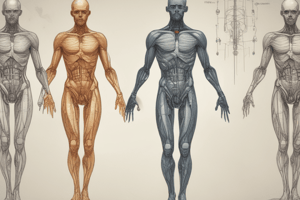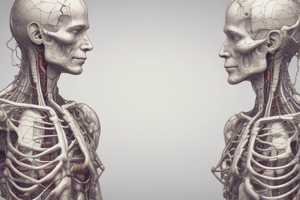Podcast
Questions and Answers
What unique property does urea possess among major naturally occurring solutes in the body?
What unique property does urea possess among major naturally occurring solutes in the body?
- It is concentrated in the renal medulla by urea transporters.
- It diffuses freely across most cell membranes. (correct)
- It is actively transported across cell membranes.
- It has a significantly higher concentration in intracellular fluid than extracellular fluid.
Which statement best describes the concept of osmotic pressure in relation to intracellular fluid (ICF) and extracellular fluid (ECF)?
Which statement best describes the concept of osmotic pressure in relation to intracellular fluid (ICF) and extracellular fluid (ECF)?
- Osmotic pressure is the result of the concentration of a single solute in a compartment.
- ICF and ECF maintain different osmotic pressures regardless of solute concentrations.
- Water moves to equalize osmotic pressure between ICF and ECF, affecting solute distribution. (correct)
- Osmotic pressure is equal between ICF and ECF due to the selective permeability of membranes.
What effect does an increase in extracellular sodium concentration have on intracellular fluid volume?
What effect does an increase in extracellular sodium concentration have on intracellular fluid volume?
- It has no effect on the distribution of body water between compartments.
- It results in a shift of water from intracellular fluid to extracellular fluid until osmotic pressures equalize. (correct)
- It leads to a decrease in extracellular fluid volume due to active transport of sodium.
- It causes water to flow from the extracellular compartment to the intracellular compartment.
Study Notes
Body Fluids Overview
- Water constitutes 55% to 65% of body weight, influenced by age, gender, and body fat percentage.
- Total body water (TBW) is divided into intracellular fluid (ICF) and extracellular fluid (ECF).
Distribution of Body Water
- 55% to 65% of TBW is contained in ICF, while 35% to 45% is in ECF.
- ECF is comprised of approximately 75% interstitial fluid and 25% intravascular fluid (blood volume).
Solute Composition
- ICF and ECF have distinct solute compositions due to specialized transport systems in cell membranes.
- Na-K-ATPase maintains sodium (Na+) in ECF and potassium (K+) in ICF.
- Chloride (Cl-) is primarily found in ECF; magnesium (Mg2+), organic acids, and phosphates are mainly in ICF.
- Glucose is present significantly in ECF because it is converted to glycogen or metabolites inside cells.
Unique Solute Behavior
- Bicarbonate (HCO3-) is found in both compartments but is concentrated three times more in ECF.
- Urea diffuses freely across cell membranes, resulting in similar concentrations in most body fluids, except in the renal medulla where it is concentrated.
Osmotic Pressure
- ICF and ECF maintain equivalent osmotic pressure, which is determined by total solute concentration.
- Biological membranes are semipermeable, allowing water to equilibrate across compartments until osmotic pressures equalize.
Distribution Dynamics
- The distribution volume of sodium (Na+) and potassium (K+) aligns with TBW, not strictly ECF or ICF.
- Elevating ECF sodium concentration ([Na+]) induces water movement from ICF to ECF, normalizing osmotic pressures.
Definition and Importance of Osmolality
- Osmolality is defined as the concentration of all solutes in a specified weight of fluid, reflecting the solution's water retention and transport characteristics.
Studying That Suits You
Use AI to generate personalized quizzes and flashcards to suit your learning preferences.
Description
This quiz focuses on the compartmentalization, composition, and turnover of body fluids. Understand the distribution of total body water, including intracellular and extracellular fluid compartments. Test your knowledge on how age, gender, and body fat influence body water composition.




